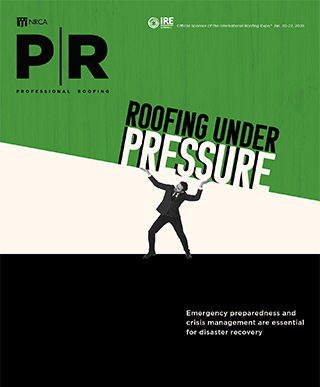For years, I've listened to consultants, speakers and experts talk to roofing professionals about their companies' online strategies and all the steps they must take to be successful.
But I rarely hear these same people talk about how these efforts actually generate what your business needs to grow the most: leads.
In fact, most "experts" don't talk intelligently about how their online strategies lead to the sequence that drives your business: Leads = Appointments = Demonstrations = Sales.
Most of these so-called experts are carefully vague about how their approaches will lead to this sequence, generalizing the online experience as "lead generation."
But not all roofing leads are created equally. Different lead sources have different values based on how well they convert to sales.
Metrics are not equal
We all look at metrics, and that makes sense—it's the only way to objectively measure results and, from there, improve your sales process. But it's not that simple.
When it comes to online metrics for roofing contractors, there are many things that can be tracked and so many experts telling you which metrics to consider that it can be overwhelming.
The worst offenders? Companies that offer roofing lead-generation services.
These companies love to trumpet the numbers they can generate for you. But like magicians, they misdirect you toward indicators that make their companies look good but fail to drive the leads, appointments and sales your company needs.
What follows are five pairs of common online metrics. In each case, I'll explain why one matters and why the other is likely to be misleading at best and a colossal waste of time and money at worst.
Visitors
Answer this question: Do all your customers live in a specific geographic area?
I'm willing to bet the answer is "yes." After all, roofing, by its nature, involves showing up, in person, at the homes of your would-be customers. Maybe your business operates in a 20-mile radius of your office. Maybe you cover three states or serve two counties. The point is you probably can't sell roof systems to customers on the other side of the country or outside your marketing territory.
Doesn't it follow the most important traffic to your website only matters when visitors are coming from inside your marketing territory? This is why you shouldn't look at the overall number of visitors to your website as an indicator of success. If you operate in a territory extending 100 miles around St. Louis, why would visitors from Seattle matter to you? It's doubtful they will ever purchase a roof system from your company.
The key is to focus on visitors to your website from within your territory. These are the visitors who could be real prospects and ultimately drive revenue. And that's the metric you should focus on as an indicator of success.
If you hire a firm to boost your website rankings (commonly known as a search engine optimization firm), I recommend you ask the firm not only to drive traffic but also to drive traffic from visitors in your particular area. It's more valuable to you, and it will be more challenging for your provider to generate. But keep your message clear to whoever manages your online marketing efforts that you are looking for visitors who are geographically desirable.
Google Analytics (I highly recommend you use this free application) offers a tool that shows you the sources of your website traffic. You can drill down to individual cities and towns, allowing you to ignore overall visitors and instead pay strict attention to the territories that matter to you.
Leads
What's a "lead" anyway?
The truth is, it could be almost any name, address, telephone number or combination thereof. And for many lead-generation companies, that broad definition is exactly what they use when promising to deliver leads.
But that's not what you need, and that's not what you should be tracking—particularly when it comes to online lead sellers.
Instead, you want to measure "issued leads," which are leads given to a salesperson to follow up after someone has spoken to an interested homeowner or building owner. Those are the leads that result in sales.
So it's much more than just a numbers game. Lead quality matters. And there are important differences between what one provider considers a lead and what another considers a good sales opportunity.
Here's an example: According to many lead-generation companies, a roofing lead could be a $30,000 renovation project. Or a $600 repair. Or a request to check for hail damage. Or $400 to replace a few shingles from a high-wind storm.
There are huge differences among these opportunities even though lead-generation companies typically refer to them all as "roofing" leads. But this is the game many companies play. They deliberately set the bar low to boost their numbers and profits.
There certainly are many high-quality roofing companies with excellent sales teams that can upsell a repair lead into a new roof system. But most cannot because homeowners with repairs in mind already have price-conditioned themselves. It is incumbent on you as the lead buyer to be sure your lead-generation service screens out as many repair leads as possible if you don't want that kind of work.
If it's not significant enough to become an issued lead that's passed to a salesperson, it's not what you're looking for. Don't let numbers fool you.
Clicks
Clicks have been around as an online metric since the dawn of the Internet. They're easy to track, and people intuitively understand what they mean.
But just as visitors from outside your marketing territory are worthless, clicks for their own sake don't matter, either.
Clicks from India, for example, are not only outside your marketing territory, they probably aren't even real (meaning they are done by "click-bots"). Traffic that stays on your website for a second (literally) also isn't coming from a real person let alone a roof system replacement prospect.
Yet they register as clicks. But wait, it gets worse.
Not only are these random clicks meaningless, unscrupulous online marketing companies will do things to deliberately increase their volumes to make their campaigns appear to perform better. It's an incredibly easy scam to perpetrate for many online marketing professionals. They can send unqualified traffic from social media promotions. They can place links to your site all over the Internet where they know it will get phantom visitors. Or they can resort to dozens of other methods that appear to generate roofing visitors.
But that's not what you want. You want human beings. And so you need to move from "clicks in general" to "clicks that matter."
Again, Google Analytics will help you. You can see where the clicks come from, and you can distinguish click-bot traffic from real people who spend time on your website and are interested in your roofing solutions.
Serious visitors will spend a minute or more on your website. They also will visit at least two to three pages as they learn more about you and what you sell. Real traffic also tends to have a lower bounce rate. This metric describes how many visitors come to your site but never click to another page before leaving. Real homeowners tend to come to sites and move around from page to page. It's another way to look at your website's analytics and determine reality vs. myth.
Calls
Pay-per-call services are growing in popularity. They generate leads in the form of calls to you. You pay based on the number of calls you receive.
And unlike all the irrelevant, misleading and downright unethical means used to generate online traffic, inbound calls don't lie. Most of the time.
Remember, when you hire a service to generate calls, it is in the company's best interest to generate as many calls as possible. Some calls will be great; others will be unqualified. One way lead-generation companies increase call volume is by deliberately misrepresenting you in online directories.
For example, many roofing contractors don't want repair work. They want full roof system replacements that are worth their time and effort and promise a healthy pay day. But for pay-per-call companies, it's not necessarily in their best interest to make that distinction. So in their programs, they may list you under "roof repair," "roof snow removal" and "gutter installation." They will drive calls to you but not necessarily for the type of work you want. Then, they trumpet their results back to you.
Other shady tactics include providing your name and number to cold-call lists and auto-dialers, as well as having technology call you during the night after business hours. The more calls that come in, high quality or not, the more money they make and the more money you waste.
The solution is to monitor your telephone traffic by tracking the number of calls you receive and the number of these that result in issued leads. You need to check for length of call, listen to sample recordings and understand which calls are billable. Most pay-per-call providers have fairly strict rules to benefit themselves.
Social media
"Followers," "likes" and "fans" on social media are all the rage these days, and they're easy to measure. And when social media activity increases, it's reasonable to assume you are making progress.
The problem is nobody has found a significant correlation between this type of activity and leads for a roofing business. It's just not there. Unlike a coffee shop where somebody may visit 80 or 90 times a year, a roofing customer relationship is immediate and temporary. Even if somebody "likes" your page, that doesn't translate into that individual spending thousands of dollars to have you provide them a new roof.
Vendors and consultants like to say you need to be big in social media. Ignore them. In the overall marketing scheme, social media plays a supporting role for your brand. But it doesn't drive any volume of leads.
On the other hand, social media reviews by customers are extremely valuable. Why? Because reviews are a new type of online currency. The more you have (good or bad, actually), the more likely Google, Yahoo and other search engines will rank your website highly.
Second, reviews are important because many prospects will read them. Homeowners perceive high risk when hiring a roofing company. They don't want to be taken by an unscrupulous provider or hire a slipshod company to work on their homes. Online reviews are an important means by which homeowners decide whether to call you.
The key is to get your team to drive online reviews. Many businesses do not have any online reviews. So getting even a handful from happy customers can make a big difference.
Now, you may ask "Won't bad reviews hurt me?" The answer is a couple of bad reviews won't hurt you. Even the best companies in the world get bad reviews. Homeowners understand that. As long as you have good reviews to counterbalance the bad ones, you're doing fine. In fact, my company has found many visitors to home improvement review sites intend to make a purchase. After all, does a homeowner casually check out online reviews for roofing companies? Of course not. He or she has a need and is doing real research.
The important thing is to make sure that as part of your standard, post-installation process (when you call to check in and ask for referrals) you also ask customers to go onto a social media site or home improvement website and review your company. It will take the homeowner five minutes, but it can pay big dividends for you in the form of higher search engine rankings.
Believe it or not, online reviews are much more valuable to your business for a number of reasons than all the "likes" in the world.
Know your metrics
Activity—even precisely measured activity—easily can be confused with results. Nowhere is this more common than when gauging success online.
Your key metrics, despite whatever the lead-generation companies may tell you, always will be those most closely tied to activities that drive real sales into your company. If you keep your focus on the metrics that matter, you'll drive more sales via the Internet.
Todd Bairstow is co-founder and principal of Keyword Connects, Waltham, Mass.



